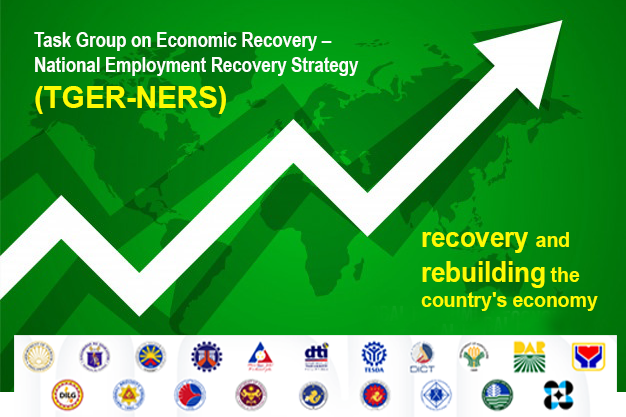
Looking beyond the global economic slowdown and millions of those who unfortunately succumbed due to the COVID-19 pandemic, Philippine government agencies forged an alliance towards recovery and rebuilding the country’s economy under the Task Group on Economic Recovery – National Employment Recovery Strategy (TGER-NERS).
Agriculture Secretary William Dar joined fellow cabinet secretaries – Karl Kendrick Chua (National Economic Development Authority), Ramon Lopez (Department of Trade and Industry), and Berna Romulo-Puyat (Department of Tourism) – and shared their respective plan of action, during the virtual presser for the TGER-NERS, on January 18, 2022.
The DA chief also presented the continuing efforts of the DA in partnership with the local government units (LGUs), private sector, and farmers’ and fisherfolk’s cooperatives and associations (FCAs) in attaining the national food security goals of the Duterte administration.
In his message, delivered by DA Assistant Secretary Agnes Miranda, Secretary Dar underscored that the Department will continue to implement current programs on sustainable food production, and provide strong support to farmers and fishers who provide the essential food needs of Filipinos.
Urging everyone’s participation in solidifying the operational framework for TGER-NERS, secretary Dar highlighted the innovations spearheaded by the Department during the most challenging times of the pandemic.
“To make food affordable and accessible to the public, and strengthen markets for our farmers and fisherfolk, the DA has implemented nationwide the Kadiwa ni Ani at Kita marketing program,” he said.
“The initiative that directly links farmers with consumers is a win-win strategy, benefitting both food producers and consumers since its roll-out in March 2020,” he added.
As of December 15, 2021, the DA Kadiwa has served a total of 1,538,356 households, and benefitted 38,383 farmers and fishers nationwide.
In the remaining months of the Duterte administration, the DA Kadiwa marketing program aims to serve more clients – roughly 3,000 individuals and 100,000 households per month.
Further, the DA through its Agricultural Credit Policy Council (ACPC) has also extended financial support to small farmers and fishers, as well as the youth engaged in agribusinesses, who were likewise affected by the pandemic.
The DA-ACPC credit programs include the Agri-Negosyo Loan Program, Kapital Access for Young Agripreneurs (KAYA), Survival Recovery (SURE), and Expanded SURE Aid and Recovery project.
DA-ACPC Director Jocelyn Badiola said that as of November 30, 2021, the agency has released through partner lending conduits (PLCs) a total of P3.1 billion (B) of loans to tens of thousands of farmers, fishers, youth, agripreneurs, and poultry and livestock raisers.
For the livestock sector, the agency as of September 2021 has provided respective grants to 81 proponents under its Livestock Economic Enterprise Development Program (LEEDP). It is currently evaluating a second batch of 84 enterprises.
To make credit more accessible, the DA-ACPC is allotting this year another P1.3B to be transferred to PLCs, which in turn target to provide P900-million worth of loans to farmers, fishers, youth entrepreneurs, and other borrowers.
In all, Secretary Dar expressed optimism on building back the country’s economy through collaborative and refocused actions set in motion by the DA in continued strong partnerships with the LGUs, private sector, partner-agencies and institutions, and FCAs.
Even with the setback caused by Typhoon Odette last year, the DA chief is hopeful that the country will reboot with a stronger and robust economy, and may even post better yields than its pre-pandemic level. ### (Adora Rodriguez, DA-AFID)













